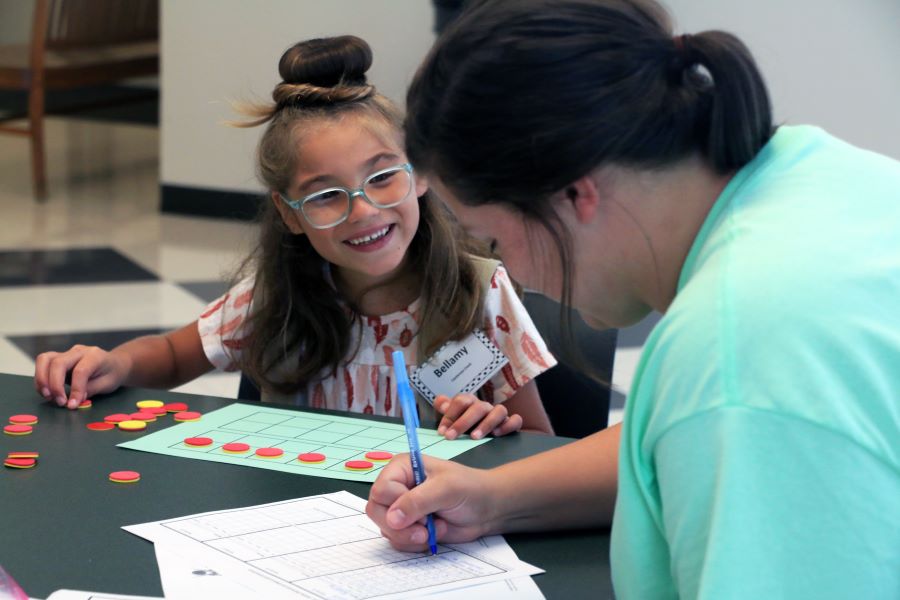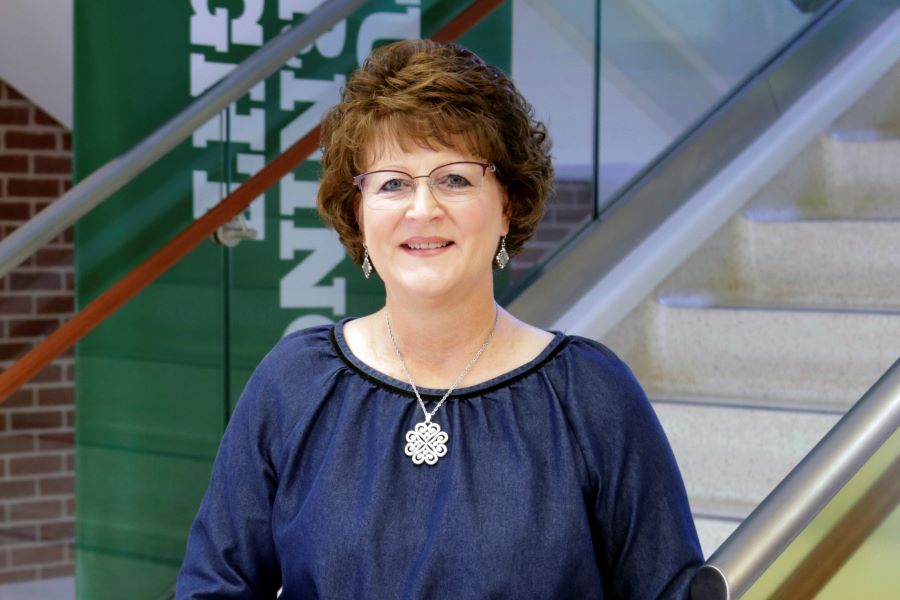Baylor University Hosts Mathematics for Early Learners Academy July 5 – 28th
Baylor University’s Mathematics for Early Learners Academy (MELA), sponsored by the Baylor School of Education (SOE), will be held at the Mayborn Museum on the Baylor campus July 5-28 for students ages 4 to 6.

Baylor University’s Mathematics for Early Learners Academy helps students develop number sense.
Contact: Kelly Craine, Baylor University Media and Public Relations, 254-297-9065
Follow us on Twitter: @BaylorUMedia
WACO, Texas (July 3, 2023) - Baylor University’s Mathematics for Early Learners Academy (MELA), sponsored by the Baylor School of Education (SOE), will be held at the Mayborn Museum on the Baylor campus July 5-28 for students ages 4 to 6.
The summer program, designed for students who have just finished PreK or Kindergarten and directed by Sandi Cooper, Ph.D., professor of mathematics education, aims to establish a solid foundation in “number sense,” especially for students who could benefit most from this summer experience in mathematics.
The program, which has measurably helped young students ages 4-6 achieve or exceed grade-level expectations in early math skills and number fluency, continues to test its new curriculum and assessments and conduct research to study the Baylor teacher education students who are teaching in the program.
“MELA is all about gaining number sense, which is composing and decomposing numbers — more than just counting,” Cooper said. “When you think about the number 5, you can see it as a sum of 3 and 2 or of 4 and 1, and there are sets of five and counting by fives. And 5 can be found in the real world; for example, a nickel represents the number 5. It’s about understanding what numbers mean, not just rote counting.”
For 2023, Baylor SOE is partnering with three school districts and hosting more than 80 students from five different elementary schools:
Waco ISD – Alta Vista Elementary, Crestview Elementary and Bell’s Hill Elementary
La Vega ISD – La Vega Primary
Midway ISD – Castleman Creek Elementary and Hewitt Elementary
MELA staff includes eight master teachers, eight Baylor students, seven paraprofessionals from participating ISDs, five graduate students (from two Baylor departments) and one research consultant, a recent Baylor doctoral graduate. Faculty includes director, Dr. Sandi Cooper, and Dr. Tracey Jones, providing ESL/Bilingual support.
Ongoing research
Cooper said that research shows early math skills are a better predictor of academic success than are reading skills but that many preschools don’t focus enough on math. Students often don’t receive interventions in math until later grades.
During MELA, the Baylor team is conducting research in early mathematics curriculum, assessment tools and teacher professional growth.
When MELA began in 2016, the teaching team modified a curriculum designed for the full academic year. Then, based on collected research data from MELA sessions, an expert team of Baylor educators developed a four-week curriculum designed for summer intervention use, such as by districts during their summer-school programs. Assessment tools administered both before and after the MELA program are part of the curriculum package being developed.
“The goal remains to produce a summer-school curriculum that would be made available to any school district,” Cooper said, noting that a faculty team also is working on efforts to support students who are English language learners, led by Dr. Tracey Jones.
In addition to the research related to the development of number sense for young learners, Cooper organized a team of graduate student researchers to study the professional growth of the Baylor SOE teacher education students as they prepared and taught math lessons in the summer program.
For the past three summers, the research focused on “Teacher Noticing” and was designed to determine how these Baylor students “notice” mathematical learning based on young learners’ verbal responses and interactions with the tasks. As part of this research, the Baylor students participated in a “video club” once a week to review video clips of themselves and their peers and discuss the process of noticing – how the teachers are noticing student activity, interpreting the students’ thinking process, and responding in real time to enhance student learning.
“There is limited research exploring in-the-moment noticing of pre-service teachers working with young children,” Cooper said. “This study provided evidence that pre-service teachers improved over a short time span while working intensively in this real-world situation and then evaluating themselves weekly through viewing videos. Some began to make more effective in-the-moment decisions and to ask more open-ended questions that required students to explain their reasoning.”
Baylor SOE junior Jordan Nguyen, an elementary education major, taught in MELA in 2022 and participated in the video clubs. He said it was his first experience watching himself teach via video, since he was a rising junior at the time. “Rather than focusing on my best or worst moments, I really got a feel for my overall teaching style from the videos and could reflect on that,” he said. “And I learned a lot by watching the videos of my peers teaching and seeing how they managed the group. We had pre-planned questions to engage students and deepen understanding, but once those questions are answered, teachers have to come with follow-up questions on the spot. It really helped to see how other teachers did that and to watch myself in retrospect.”
For 2023, the research team will also study professional growth through professional coaching by implementing and evaluating a cycle of mentoring relationship between the Master Teachers and the Baylor teacher-education students.
Baylor Campus Benefits
Cooper said the MELA experience is enhanced by being on the Baylor campus, based at the Mayborn Museum.
“The Mayborn provides appropriate classrooms, and the students also can venture into the wonderful exhibits,” Cooper said. “We go on number walks throughout the museum, and we are able to go into the exhibits to experience mathematical explorations.”
Students will also enjoy this summer’s “Scooby-Doo” special exhibit at the Mayborn, and MELA includes field trips to other campus locations, such as the Bill and Eva Williams Bear Habitat and Baylor athletic facilities.
“By hosting all children at the Mayborn, we are able to offer more instructional time devoted to the concepts presented in the newly developed MELA curriculum,” Cooper said. “At the Mayborn, MELA is from 9:00 a.m. to 12:00 p.m., and the entire time is organized by the MELA staff and focused on math. The instructional time includes whole group lessons, small group lessons, stations and museum walks focused on number development.”
ABOUT BAYLOR UNIVERSITY
Baylor University is a private Christian University and a nationally ranked Research 1 institution. The University provides a vibrant campus community for more than 20,000 students by blending interdisciplinary research with an international reputation for educational excellence and a faculty commitment to teaching and scholarship. Chartered in 1845 by the Republic of Texas through the efforts of Baptist pioneers, Baylor is the oldest continually operating University in Texas. Located in Waco, Baylor welcomes students from all 50 states and more than 90 countries to study a broad range of degrees among its 12 nationally recognized academic divisions.
ABOUT BAYLOR SCHOOL OF EDUCATION
For more than 100 years, the School of Education has advanced Baylor’s mission across the globe while preparing students for a range of careers focused on education, leadership, and human development. With more than 60 full-time faculty members, the school’s growing research portfolio complements its long-standing commitment to excellence in teaching and student mentoring. Baylor’s undergraduate program in teacher education has earned national distinction for innovative partnerships with local schools that provide future teachers deep clinical preparation. Likewise, the School of Education’s graduate programs have attained national recognition for their exemplary preparation of research scholars, educational leaders, innovators, and clinicians. Visit the School of Education website to learn more.
